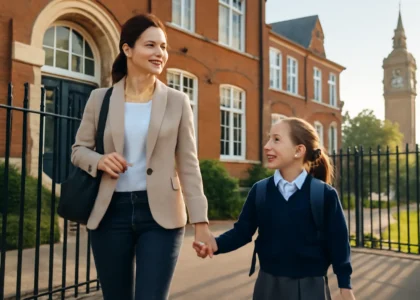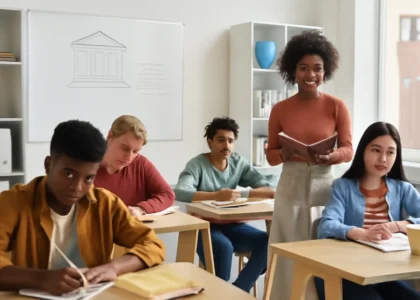With thousands of schools across the UK competing for parents’ attention, your child’s good grades won’t help if they can’t handle real-world problems. Hence, the need for character development!
Character-focused education is a great way to build your child’s skills, confidence, and life readiness. This learning approach helps your student become well-rounded and ready for any challenge.
In this guide, we’ll dive deep into practical ways to develop character that help students succeed. You’ll learn why complete education is important for today’s students and understand specific approaches from schools that focus on developing the whole person beyond academic success.
Ready to learn more about how character development shapes your child’s future? Let’s get started.
Building Character Development That Lasts
Ask any employer what they want in new workers. The answer might surprise you. It’s rarely about technical skills or grades. They want people with good values, strength, and teamwork skills. That’s why character education is more important than most parents think for preparing students for real-world success.
Our team has found that character development doesn’t happen overnight. It needs intentional practice and real-world application.

Here’s how we build character development in three ways that create positive character traits.
Core Ethical Values Live in Every Lesson
Rather than separate “character lessons,” we embed core ethical values throughout the school day. For example, during literature classes, students explore moral choices characters make. In group projects, they practice honesty when things go wrong and learn to support struggling teammates. Soon enough, character development becomes natural when children see it modelled in every subject.
Growing Leadership Skills Through Real Practice
True leadership skills grow through experience, not theory. Our students prove this point perfectly. They lead assemblies, organise charity drives, and mentor younger peers. Every single opportunity teaches them more. They learn that effective leaders listen first, support their community, and take responsibility when challenges arise.
Small Daily Choices Build Strong Character
Responsibility becomes a habit when students practice it consistently in our school community. Day by day, children manage their own learning goals, care for shared spaces, and follow through on commitments they make to teachers and peers. When students make small daily choices, they build the foundation for big life decisions later.
Strong character helps students understand others and build better relationships.
The Power of Social Emotional Learning
Did you know that emotional intelligence often predicts success better than test scores? Research says that when kids learn social and emotional skills, they do better in school and life. The good news is that these abilities can be developed through practice in our school community.
As part of this growth, social awareness becomes stronger when students learn to read situations and respond appropriately.
We focus on these four core areas that build relationship skills and create positive relationships:
- Understanding social awareness: Kids learn to pick up on social signals around them. When a classmate seems quiet or group discussions get tense, it becomes a chance to step in with the right words.
- Strong relationship skills: Empathy and listening abilities grow through guided activities. The practice helps children share feedback kindly and handle criticism like pros.
- Emotion management that works: Every child faces stress and disappointment at some point. For this reason, our approach gives students the skills to bounce back quickly and stay calm under pressure.
- Reading social cues: Hidden messages appear in every conversation. And kids develop the ability to spot facial changes, voice shifts, and body positions to understand and help others better.
Over time, these skills become second nature. Kids will handle tricky social situations with ease and confidence.
The Bridge to Real-World Success
Most new workers struggle in their first jobs. It’s not something like they don’t know enough. It’s because they can’t talk well with others or solve problems together. This gap between school learning and real work is much wider than most parents think. The reason is simple: students need real practice before they face actual challenges.

That’s exactly why our approach focuses on building talking skills and working together skills that bosses really want. Through hands-on practice in safe places, students gain the confidence they’ll need when they start their careers.
Positive Outcomes Through Character Development
Something special happens when students take their character skills into the real world. After building strong foundations, it’s time to put everything into practice. This is how community service and encouraging volunteering become the best way to apply everything we’ve taught.

We apply four practical steps that change school-based learning into real community results:
- Real community needs become opportunities when matched with student interests (food banks, elderly care, environmental projects).
- We guide students through volunteer work with proper support and reflection time.
- Personal growth becomes visible as students help others succeed.
- Recognition goes beyond test scores to celebrate character wins.
These experiences build civic virtue while creating positive outcomes for everyone involved. Students see that their actions create change and develop the well-being that comes from leaving a positive mark on other people’s lives.
The Path to Complete Student Success
Today’s education faces a serious challenge. Students do well in tests but struggle with real-world skills like communication and teamwork. This gap between academic success and practical ability makes parents worry their children aren’t ready for life after school. However, complete character development provides effective solutions to bridge this gap.
We’ve looked at how character education, social emotional learning, relationship skills, and community service work together to help students. These methods build talking skills, emotional smarts, and good values that create better results than just test scores in any school.
Give your child the complete education they deserve at Juergens Meyer. Our proven approach develops confident, capable students ready for real-world success. Contact us today to start their journey.





